Shinzo Abe: Accused killer makes wild cult claim as Japan’s ruling party secures strong win
Shinzo Abe’s accused killer has reportedly revealed a motive, as Japan’s ruling party secured a strong win.
World
Don't miss out on the headlines from World. Followed categories will be added to My News.
The man accused of killing former Japanese prime minister Shinzo Abe has reportedly revealed a motive for the assassination.
Tetsuya Yamagami, 41, is in custody and has told investigators he targeted Abe because he believed the politician was linked to a religious cult that he blamed for the loss of his family’s fortune, according to the London Times.
Yamagami, who is accused of shooting Abe with a homemade gun, reportedly told police he believed that the former leader had links to the Unification Church, a South Korean group also known as the Moonies.
Japan’s newspapers and television stations have reported anonymous police briefings saying that Yamagami had confessed to planning the attack on Abe, 67, over several months, but insisted that he was not motivated by politics.
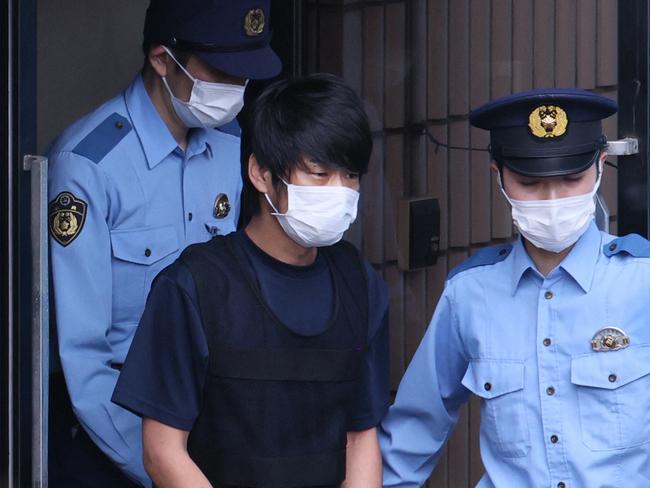
Instead they say that he was attempting to strike a blow against a religious organisation to which his mother gave away the family’s assets after the death of her husband, resulting in bankruptcy and the impoverishment of her family.
The Unification Church was founded in 1954 by Sun Myung Moon, who claimed to be the Messiah.
The Yomiuri newspaper quoted him as telling police: “As my mother is a follower of [the church], and was declared bankrupt after donating large amount of money. I thought I had to punish them without fail.”
His first thought was to go after a “top person” in the church, but he gave this up as too difficult. “I thought Abe had a connection with it, so I carried out the shooting.”
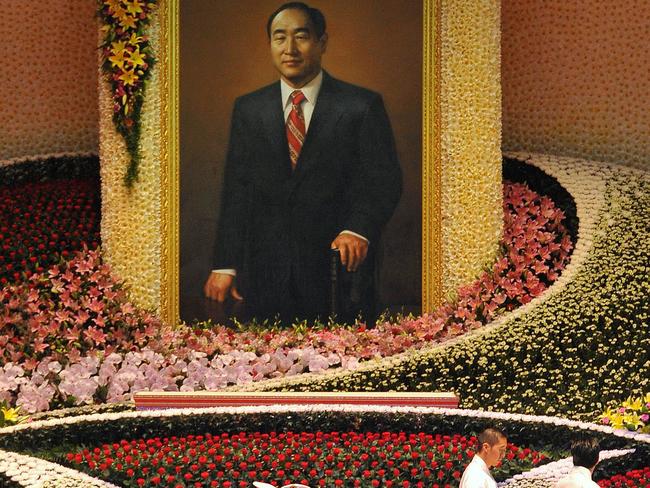
The extent of Abe’s connections with the Moonies is not clear. Akahata, the newspaper of Japan’s communist party, has previously reported that he sent congratulatory messages and gave online speeches at ceremonies held by a front organisation for the church.
An unnamed relative of Yamagami told the Asahi newspaper that his mother had inherited her late husband’s construction company but gave away so much money that she and her three children were all but destitute.
JAPAN’S RULING PARTY SECURES STRONG WIN
Japan’s ruling party and partners won enough votes to form a supermajority in an upper house election held just days after the assassination of former prime minister Shinzo Abe, local media says.
The ex-premier’s ruling Liberal Democratic Party (LDP) and its coalition partner Komeito strengthened their hold by more than 75 of the 125 upper house seats up for grabs, according to national news outlets.
The parties are part of what is now a two-thirds supermajority willing to amend the country’s pacifist constitution, thereby strengthening its military role on the global stage – a longtime Abe goal.
Even before the former prime minister’s murder, the LDP and Komeito were expected to cement their majority, though the final number of seats will be scrutinised for signs of whether the attack bolstered support for them.
“I think it is significant we were able to complete the elections,” Prime Minister Fumio Kishida told NHK, adding he wants to tackle the pandemic, Ukraine-related issues and inflation.
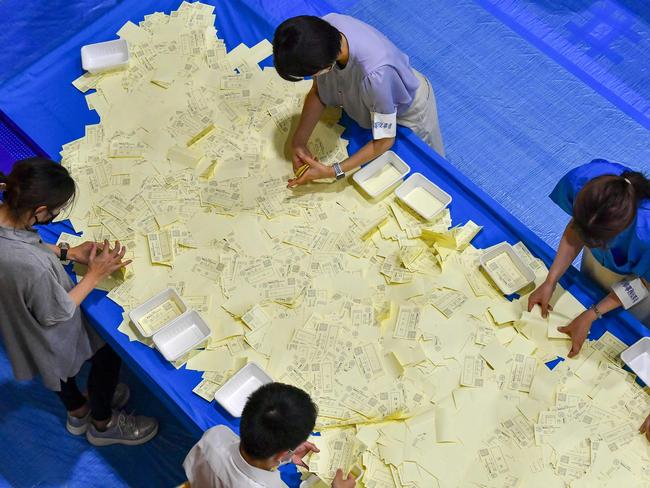
Kishida had insisted the election proceed despite the assassination, saying “we must never allow violence to suppress speech.”
Conceding defeat, Kenta Izumi, leader of the opposition Constitutional Democratic Party, which was projected to have lost several seats, said it was clear “voters did not want to switch from the LDP and entrust us with running the government,” according to Kyodo News.
Despite the murder, turnout rate for the election remained low at only 52 per cent, national outlets reported.
Abe was gunned down at close range on Friday in the western region of Nara, and died of blood loss at a local hospital. His body was brought to his family home in Tokyo on Saturday.
‘UNDENIABLE’ FLAWS IN SECURITY
There were “undeniable” flaws in security for former prime minister Shinzo Abe, the head of police in the area where the leader was assassinated admitted on Saturday, pledging an investigation.
“I believe it is undeniable that there were problems with the guarding and safety measures for former prime minister Abe,” Tomoaki Onizuka, head of the Nara prefectural police, told reporters, pledging to “fully grasp the problems and take appropriate action”.
A day after the assassination of former prime minister Shinzo Abe, a steady stream of mourners, many in tears, arrived at the scene of his murder in western Japan to offer flowers and prayers.
People from all walks of life formed a long line on the otherwise ordinary street outside a train station where Abe was shot while campaigning ahead of weekend elections.
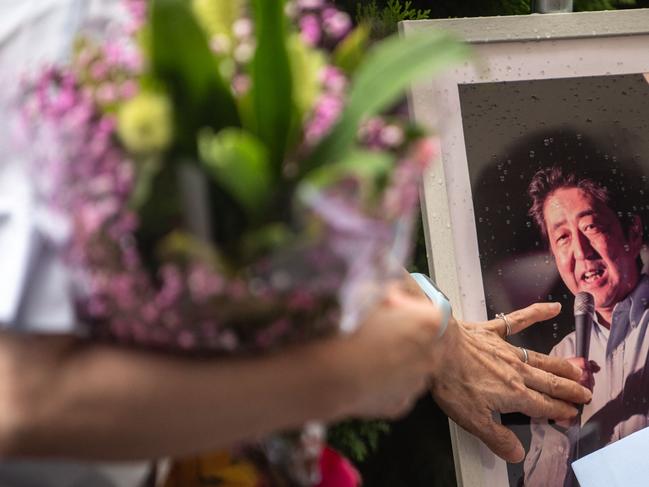
Afternoon downpours did not deter the crowds who came to offer condolences, some having travelled great distances like 51-year-old Yoshikazu Tokudome, who flew hundreds of kilometres from the Tokyo region to the city of Nara.
“I’m just in pain, and I thought the least I could do was come here and lay some flowers,” the company worker said.
When he heard about the death of Abe, Japan’s longest-serving prime minister, “I could understand what was being said in the news, but I just couldn’t accept it.”
Visitors like Tokudome bowed deeply with their eyes closed, some weeping as they laid flowers on a table in a tent set up near Yamato-Saidaiji Station.
Friday’s events unfolded rapidly, with Abe speaking confidently into a microphone before he was shot down and the suspect immediately tackled to the ground.
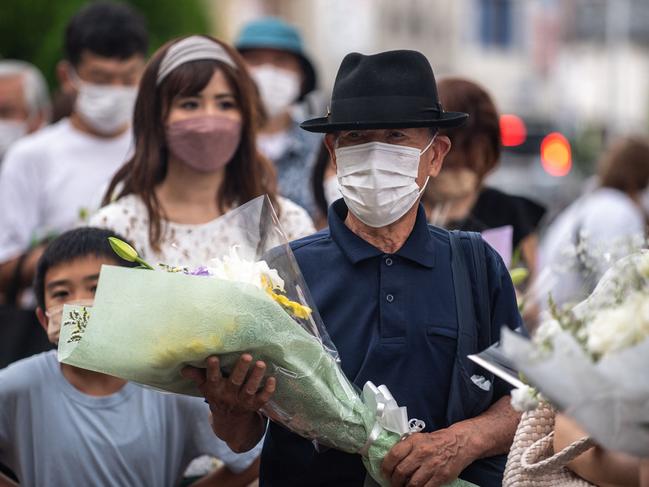
“It’s just shocking and I’m so sad. I was feeling really restless at home,” said Sumiko Hayashi, 50.
“I really liked him as a person, too,” she said, especially “the way he looked so happy with his wife.”
As bouquet after bouquet was piled onto the table, it became a makeshift altar adorned by framed photos and cartoon illustrations of a smiling Abe, who was forced to resign from office in 2020 due to poor health.
Cans of beer and other drinks were also placed on the table for the politician to enjoy in the afterlife, but the overriding mood was sombre.
Wiping away tears, 52-year-old Kayoko Ueda, from the neighbouring region of Osaka, told AFP she was “distraught” and “couldn’t believe something like this could actually happen in Japan”.
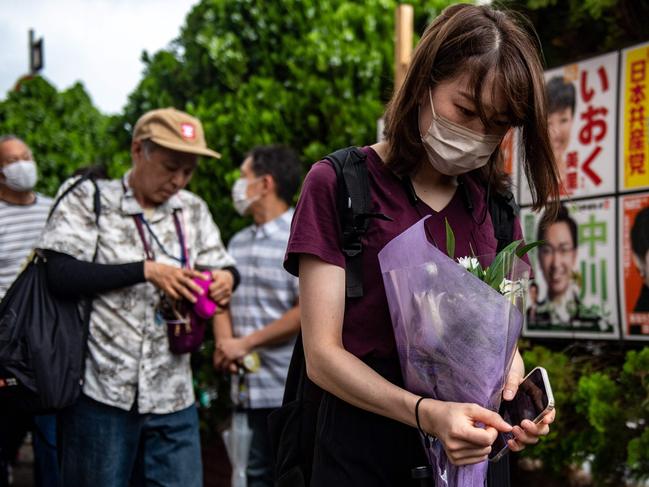
Violent crime is very rare in the country, which also has some of the world’s strictest gun laws.
The suspect has been identified as 41-year-old Tetsuya Yamagami, who footage showed approaching Abe from behind and then opening fire with an apparently handmade gun.
The killing has sparked scrutiny over whether security measures at the stump speech were sufficient, and some mourners told AFP more could have been done.
“Security was lax. It exposed, I think, how Japan was complacent in thinking everything is safe here,” Ueda said.
Akira Takahashi, a 54-year-old Osaka resident, agreed.
“High-ranking officials from overseas, like prime ministers and cabinet members, often visit Japan under the assumption that this is a safe country,” he said.
“But I think security should be strengthened much more in the future.”
With tears in his eyes, Takahashi, who always thought highly of Abe, said that as he laid flowers, “I told him ‘thank you for everything, and please rest in peace.’”
WORLD PAYS TRIBUTE TO SHINZO ABE
An outpouring of grief at the shock assassination of former Japanese prime minister Shinzo Abe during a pre-election speech on Friday has been matched in Australia by federal and state leaders with visual tributes planned across the nation on Saturday night.
Australian Prime Minister Anthony Albanese told media on Saturday that Japan had lost “a true patriot and a true leader” while Australia had lost “a true friend”.
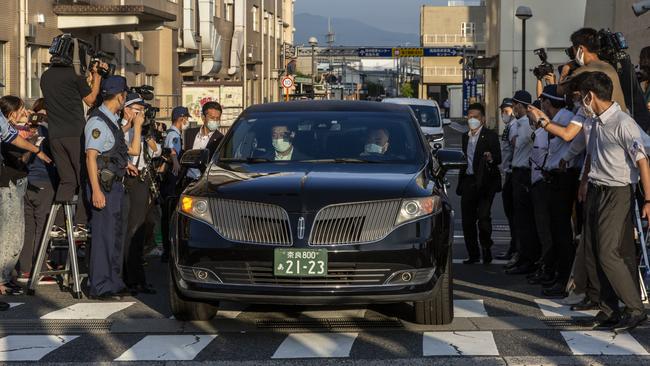
Mr Albanese described Mr Abe’s relationship with Australia as being “warm in sentiment and profound in consequence” noting the respected leader had visited Australia five times.
Mr Albanese said lights at Parliament House, across Melbourne landmarks, Adelaide and other states and territories would be illuminated on Saturday night in the Japanese national colours of red and white.
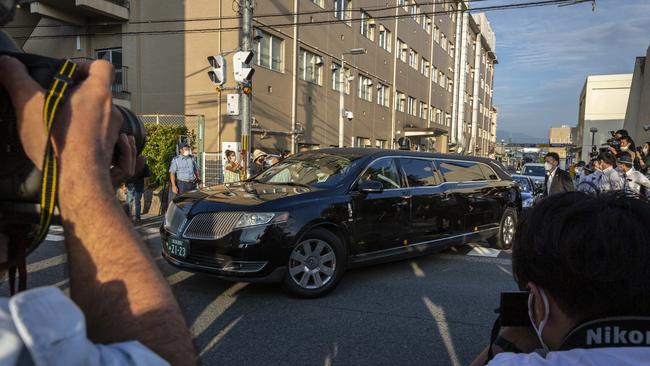
In Melbourne, Victorian Premier Daniel Andrews said landmarks across the city would be lit up in honour of Abe in red and white to “remember the life of Japan’s longest serving Prime Minister”.
“The death of Shinzo Abe is an unspeakable tragedy,” he said.
“He served his country with great honour and transformed the geopolitics of our region.
“He was a wonderful friend of Australia and my thoughts and prayers are with his wife, his family, and the Japanese people.”
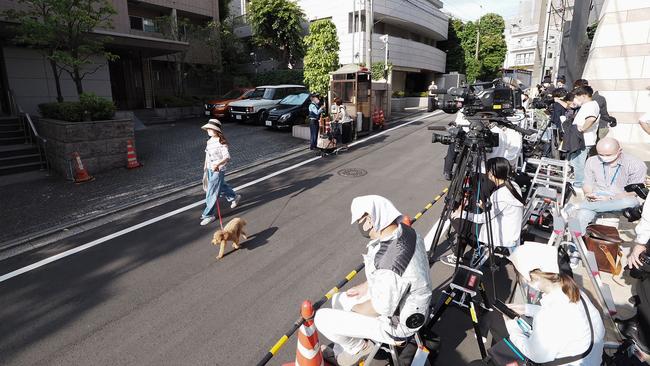
Japan on Saturday mourned the assassination of former prime minister Shinzo Abe, whose body was being moved to Tokyo from the western town where he was gunned down at close range on the campaign trail.
He was visibly emotional after the former leader’s death was confirmed, pronouncing himself “lost for words”.
Police were investigating the unemployed 41-year-old’s background, including claims he had served in the Maritime Self-Defence Force, Japan’s navy, and said he appeared to have used a handmade gun.
Abe was delivering a stump speech ahead of Sunday’s upper house elections when he was shot, and campaigning was resuming Saturday, with politicians saying they were determined to show the murder could not stop democracy.
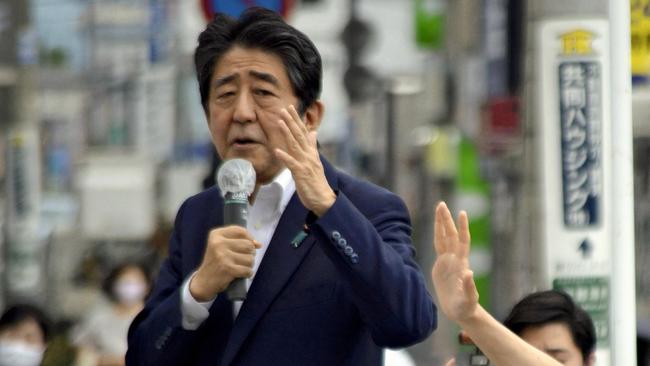
Shortly before 6am, a funeral hearse carrying Abe’s wife Aki and believed to be transporting the former leader’s body left the hospital in Kashihara, western Japan where he was treated.
Doctors at the Nara Medical University hospital said Friday that Abe showed no vital signs when he arrived and died of enormous blood loss, despite massive transfusions.
They described multiple wounds to the prime minister’s neck, with the internal damage reaching as deep as his heart.
Abe’s murder shook Japan, with Prime Minister Fumio Kishida describing the killing as a “barbaric act” that was “unforgivable”.
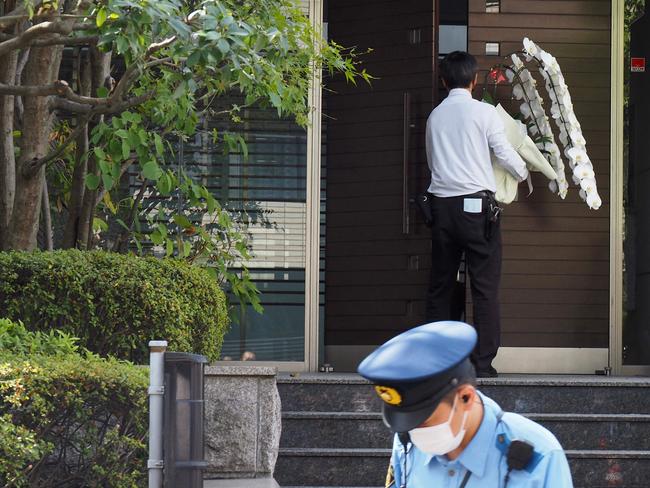
The suspected killer of the respected Japanese leader admitted targeting the politician and said he held a grudge against an organisation he believed Abe was connected to, police said.
Senior police officers in the western region of Nara, where the murder took place, named the suspect as unemployed 41-year-old Tetsuya Yamagami, who said he had used a handmade gun.
“That’s the suspect’s assertion, and we have determined that (the gun) is clearly handmade in appearance, although our analysis is currently ongoing,” an officer told reporters.
Police declined to give details of the “particular organisation” mentioned by the suspect, saying investigations were ongoing, but several Japanese media outlets described it as a religious group.
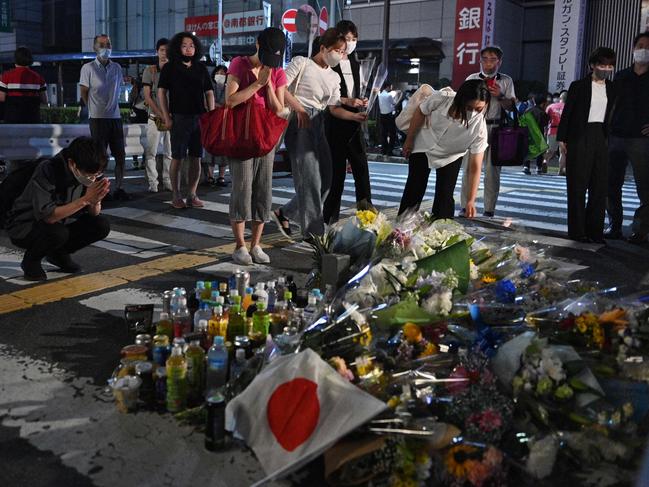
Yamagami was pictured at the scene holding a large boxy black object that appeared to have two barrels.
Officers in protective gear began searching the suspect’s home after 5pm and have confiscated “several handmade gun-like items”.
The suspect, who addressed police in a “matter-of-fact way”, told officers he had worked for the Maritime Self-Defence Force — Japan’s navy — for three years from 2002, but these details are also under investigation.
Yamagami also told police he had learned about Abe’s visit online, the officers said.
They added that they were probing whether there were any problems with security at the campaign event where the assassination took place on Friday morning.
“We will take appropriate measures if problems were discovered.”
‘BARBARIC’: SHINZO ABE ASSASSINATED
The murder of the 67-year-old, who had been Japan’s longest-serving leader, stunned the nation and prompted an international outpouring of grief and condemnation.
It was all the more shocking given Japan’s strict gun laws and low rates of violent crime, with Prime Minister Fumio Kishida describing it as a “barbaric act” that was “absolutely unforgivable.”
Mr Abe was shot shortly before noon while campaigning in the western region of Nara ahead of weekend upper house elections.
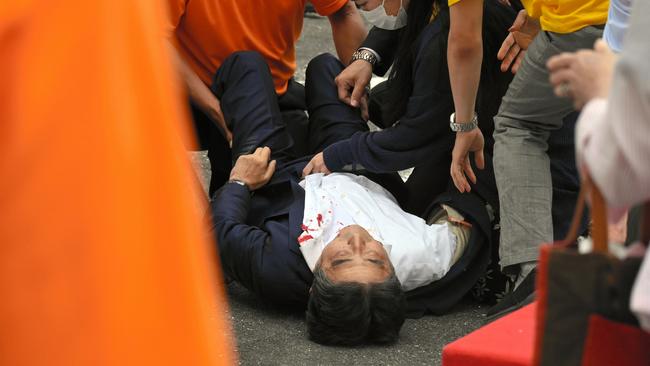
He was flown by helicopter to the Nara Medical University hospital where he was pronounced dead several hours later.
“Shinzo Abe was transported to (the hospital) at 12:20pm. He was in a state of cardiac arrest upon arrival,” said Hidetada Fukushima, professor of emergency medicine at the hospital.
“Resuscitation was administered. However, unfortunately he died at 5:03pm.”
Fukushima said Mr Abe had suffered two gunshot wounds to the neck and died of massive blood loss, despite being administered enormous transfusions.
A visibly emotional Mr Kishida told reporters after Mr Abe’s death was confirmed that he was “lost for words”.
He earlier abandoned the campaign trail and flew to Tokyo by helicopter where in a quivering voice he condemned “a barbaric act during election campaigning, which is the foundation of democracy.”
“It is absolutely unforgivable. I condemn this act in the strongest terms.”
The attack occurred as Mr Abe delivered a stump speech with security present, but spectators able to approach him easily.
Footage broadcast by NHK showed him standing on a stage when a man dressed in a grey shirt and brown trousers approached from behind, before drawing a weapon from a bag and firing.
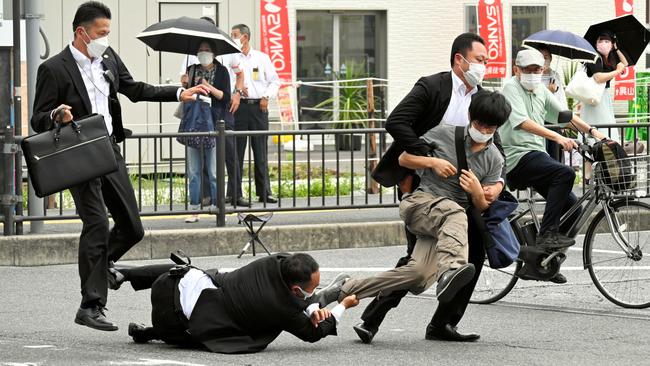
At least two shots appear to be fired, each producing a cloud of smoke. As spectators and reporters ducked, a man was shown being tackled to the ground by security and he was arrested.
Local media identified the man as 41-year-old Tetsuya Yamagami, citing police sources, with several media outlets describing him as a former member of the Maritime Self-Defence Force, the country’s navy.
He was wielding a weapon described by local media as a “handmade gun”, and NHK said he told police after his arrest that he “targeted Abe with the intention of killing him”.
WORLD LEADERS REACT TO ABE’S DEATH
World leaders condemned Friday’s assassination of former Japanese Prime Minister Shinzo Abe, while paying tribute to him as a “great” leader.
Australian Prime Minister Anthony Albanese tweeted he was “shocked and saddened by the tragic death of former Japanese PM Abe Shinzo”.
Shocked and saddened by the tragic death of former Japanese PM Abe Shinzo. He was a great friend and ally to Australia. Deepest sympathies to his family and the people of Japan. We mourn with you. pic.twitter.com/ms9Va9OPN4
— Anthony Albanese (@AlboMP) July 8, 2022
United States Secretary of State Antony Blinken mourned the slain former premier as a visionary leader who boosted relations between the two allies.
Meeting his Japanese and South Korean counterparts jointly at a G20 meeting in Bali, Blinken called Mr Abe “a leader with great vision” who “brought the relationship between our countries, the United States and Japan, to new heights”.
UK Prime Minister Boris Johnson tweeted the news of Mr Abe’s death was “incredibly sad”.
“My thoughts are with his family, friends and the Japanese people,” he said.
Incredibly sad news about Shinzo Abe.
— Boris Johnson (@BorisJohnson) July 8, 2022
His global leadership through unchartered times will be remembered by many. My thoughts are with his family, friends and the Japanese people.
The UK stands with you at this dark and sad time.
Russian President Vladimir Putin called the death an “irreplaceable loss”.
In a telegram to Mr Abe’s family, Mr Putin called the former leader an “outstanding statesman” who had done a lot to develop “good neighbourly ties between our countries”.
Ukrainian President Volodymyr Zelensky extended his condolences to Mr Abe’s family.
“Horrible news of a brutal assassination of former Prime Minister of Japan Shinzo Abe. I am extending my deepest condolences to his family and the people of Japan at this difficult time. This heinous act of violence has no excuse,” he tweeted.
Former Australian Prime Minister Malcolm Turnbull also took to social media, saying: “Japan has lost its most important modern leader”.
Japan has lost its most important modern leader, Akie her dear husband and Australia a great friend. Struck down by an assassin, Abe Shinzo’s powerful positive impact on his country and our region will endure. Lucy and I send Akie and the Japanese people our deepest sympathy.
— Malcolm Turnbull (@TurnbullMalcolm) July 8, 2022
French President Emmanuel Macron said “Japan has lost a great prime minister”.
Mr Abe had “dedicated his life to his country and worked for stability in the world”, Mr Macron said in a tweet.
German Chancellor Olaf Scholz expressed shock and solidarity with Japan over the killing.
“The deadly attack on Shinzo Abe has left me aghast and deeply sad,” the German leader tweeted.
“I extend deep sympathy to his family, my colleague Fumio Kishida and our Japanese friends.”
Indian Prime Minister Narendra Modi declared a day of national mourning would be held in honour of Mr Abe.
“I am shocked and saddened beyond words at the tragic demise of one of my dearest friends, Shinzo Abe,” Modi wrote on Twitter.
“We stand in solidarity with our Japanese brothers and sisters in this difficult moment.”
Mr Abe was reportedly unconscious, showing no vital signs, when he was taken to Nara Medical University via helicopter and was seen bleeding from the chest.
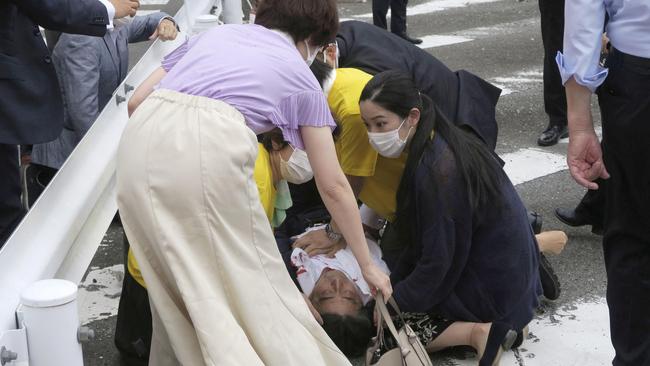
Former Tokyo Governor Yoichi Masuzoe tweeted Mr Abe was in a state of cardiopulmonary arrest.
The term is often used in Japan before a death is officially confirmed, reports the BBC.
“Former prime minister Abe was shot at around 11.30am in Nara. One man, believed to be the shooter, has been taken into custody. The condition of former prime minister Abe is currently unknown,” chief cabinet secretary Hirokazu Matsuno told reporters.
“Whatever the reason, such a barbaric act can never be tolerated, and we strongly condemn it.”
Footage broadcast by NHK shows Mr Abe standing on a stage when a loud blast is heard and smoke is visible in the air.
A man is then seen being tackled to the ground by security.
Little is known of the shooter but the Japan Times reported he was 42, a resident of Nara, and a former member of the Japanese Navy.
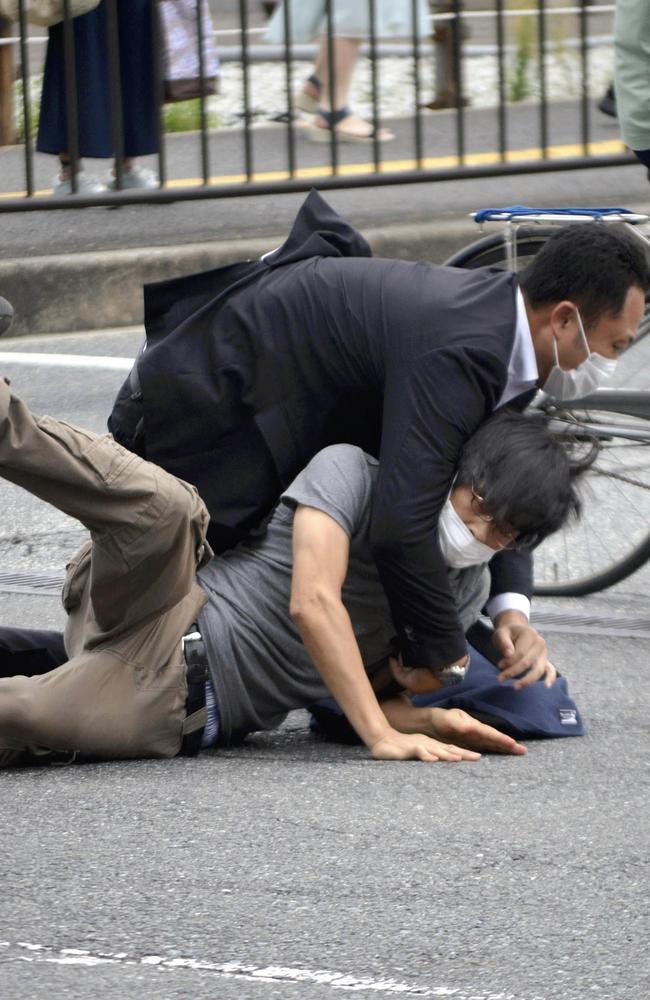
“He was giving a speech and a man came from behind,” a young woman at the scene told NHK.
“The first shot sounded like a toy. He didn’t fall and there was a large bang. The second shot was more visible, you could see the spark and smoke,” she added.
“After the second shot, people surrounded him and gave him cardiac massage.”
The apparent assassination attempt happened at the Yamato Saidaiji Station while Mr Abe was giving a political stump speech.
Officials from the local chapter of Abe’s Liberal Democratic Party said there had been no threats before the incident and that his speech had been announced publicly.
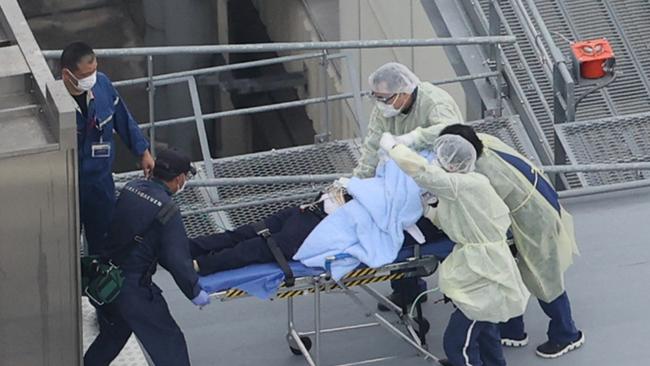
Mr Abe visited Australia five times while he was in power.
In 2014 he addressed federal parliament, and he deepened ties with subsequent visits to Sydney in 2017 and Darwin in 2018. His visit to the Top End marked the first time a Japanese leader visited Darwin since the bombing of 1942.
In 2007, he also proposed the ‘Quad,’ the security grouping of Japan, India, the US and Australia, as a hedge against China’s increasing assertiveness. While detractors were sceptical of the Quad’s worth at first, in more recent years it has been regarded as a cornerstone alliance underpinning regional security.
Mr Abe served as prime minister between 2006 and 2007, before a second term starting in 2012. In 2020, he stepped down as prime minister, citing health concerns.
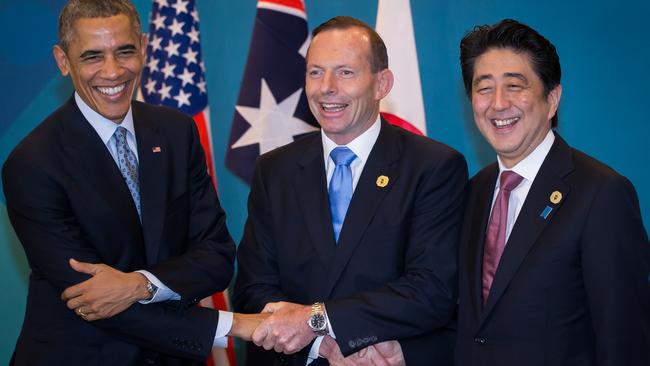
Gun deaths in Japan are extremely rare, according to Sydney University’s GunPolicy.org website: there were just nine gunshot fatalities in Japan in 2018.
But political assassinations in Japan are not unheard of. Two Prime Ministers were killed during the 1930s and at least four politicians have been murdered since the end of World War Two.
SHOCK AFTER ABE SHOT
New Zealand Prime Minister Jacinda Ardern said she was “deeply shocked” to hear about the incident.
“He was one of the first leaders I met when I became PM. He was deeply committed to his role but also generous & kind … Events like this shake us all to the core,” she said.
“Deeply distressed by the attack on my dear friend Abe. Our thoughts and prayers are with him, his family, and the people of Japan,” said Indian Prime Minister Narendra Modi.
Former US President Donald Trump posted on Truth Social: “Absolutely devastating news that former Prime Minister Shinzo Abe of Japan, a truly great man and leader, has been shot, and is in a very serious condition. He was a true friend of mine and, much more importantly, America. This is a tremendous blow to the wonderful people of Japan, who loved and admired him so much.”
Australian Prime Minister Anthony Albanese tweeted that it was “shocking news”.
“Our thoughts are with his family and the people of Japan at this time,” Mr Albanese stated.
Shocking news from Japan that former PM Shinzo Abe has been shot - our thoughts are with his family and the people of Japan at this time
— Anthony Albanese (@AlboMP) July 8, 2022
Former Australian prime minister Malcolm Turnbull said on Twitter he was “Horrified by this terrible news from Japan”.
“Abe Shinzo is one of the great leaders of our times. Right now we must hope and pray he pulls through.”
Former prime minister Kevin Rudd issued a statement saying “Australians will have a sense of disbelief that this act of apparent political violence could be committed in such a free, open and robust democracy as Japan.”
“This apparent assassination attempt provides a sober reminder to all our democracies of how precious our freedoms are.
“An attack on any democratically elected political leader in the world is an attack on supporters of democracy everywhere,” Mr Rudd said.
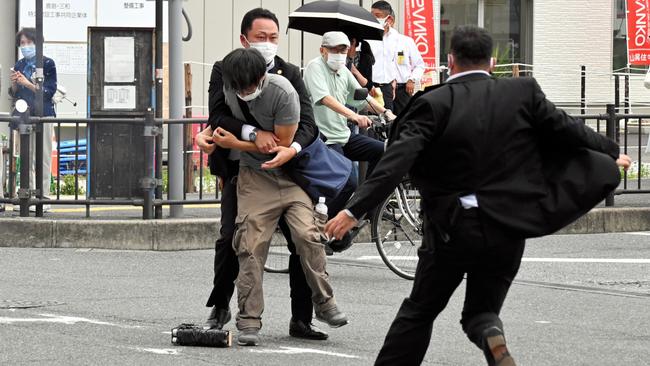
UK Prime Minister Boris Johnson said he was “utterly appalled and saddened” to hear of the attack.
“My thoughts are with his family and loved ones,” Mr Johnson tweeted.
The US ambassador to Japan, Rahm Emanuel, said he was “saddened and shocked” by the shooting.
“We are all saddened and shocked by the shooting of former prime minister Shinzo Abe. Abe-san has been an outstanding leader of Japan and unwavering ally of the United States. The US Government and American people are praying for the wellbeing of Abe-san, his family, and people of Japan,” Emanuel said in a statement.




